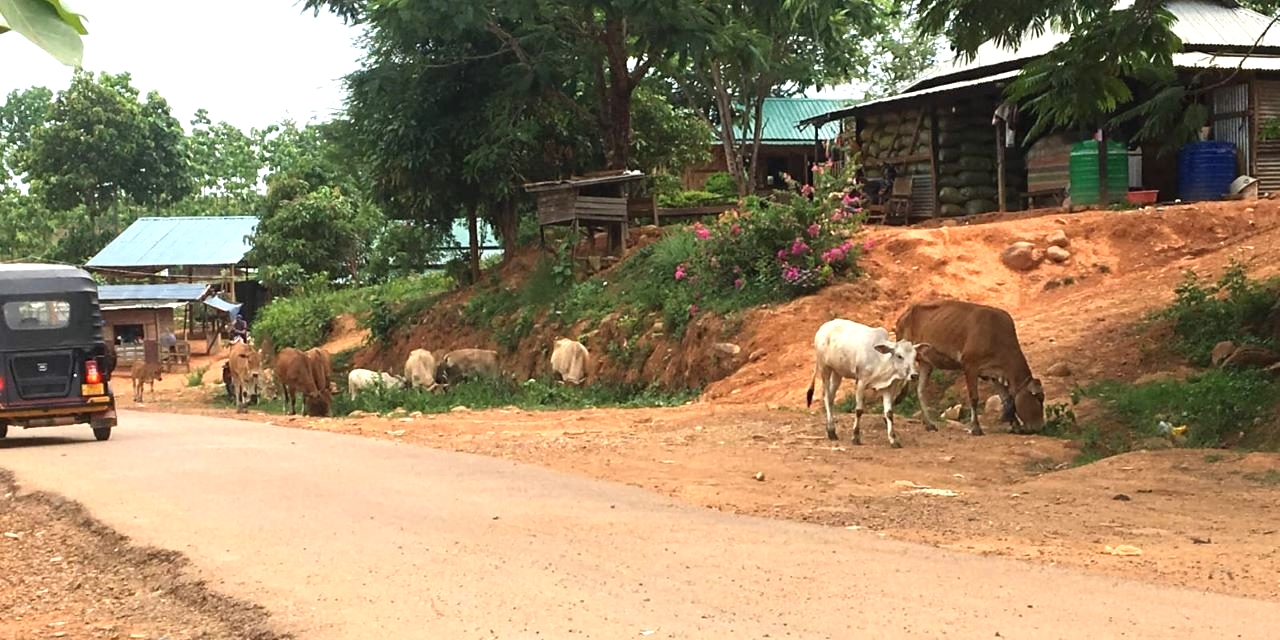Climate Change and Conflict By Robert Mizo | 21 March, 2022
Climate Change and the Tribal Communities of Manipur, India

Image: Haolenphai Village, Manipur / Ms. Hatneihoi Haokip
Climate change is bound to have far-reaching implications on tribal societies even though they have traditionally lived in close harmony with nature. For them, climate change is an issue of human rights and equity as it threatens to disrupt their traditional ways of life and production through land degradation, agricultural shifts, changes in rainfall patterns, higher incidence of pests and diseases.
The tribal communities of Manipur in India are no exception, as an interview-based study conducted by this author reveals. The tribal communities who form the minority in terms of population predominantly occupy the rugged hilly regions of the state. They are beginning to witness the effects of climate change on their local weather, water resources, agricultural practices, and productivity, all of which have further impinged upon their larger human security, economies, cultures, and social cohesion.
All interviewees, who were agriculturally-oriented local elders, agreed that they have observed significant changes in various aspects of their local environment. One of the most common observations pertained to the increase in local temperature. This was seen in the cessation of winter snow and frost and the steady lengthening of summer months. These have resulted in the alteration in the agricultural cycles over the years and increase incidence of mosquitoes and other pests.
Changes in local water sources was reported from across the districts studied. Several ponds and small lakes were reported to have dried up in the past two decades while the volume of water flow in local rivers and streams has decreased visibly. River flows are also reported to have become more erratic than ever as they are prone to switch from extremely lean to flood-like flows. This has resulted in water shortage for both household consumption and agriculture.
Respondents have also reported the increase in freakish weather in their immediate locations. Unprecedented bouts of thunderstorms and hailstorms are observed to be increasing in frequency. Such events have caused the destruction of people’s habitats, community buildings and churches, infrastructures such as roads, bridges, electricity, and communication towers, in addition to vegetation, paddy fields and livestock.
Further, interviewees reported the gradual alteration of the local rain cycles. This has rendered farmers unable to sow and harvest crops as per the traditional practice. For instance, farmers reported the gradual disappearance of go sagi (seven days’ rain) which was considered crucial in the ripening of rice paddy and heralding the onset of harvest.
The above changes in the local environment and climate have affected the farming practices of these communities. There have been changes in agricultural patterns, vegetation and crop types, and a decline in the crop yield. Many are concerned that rice cultivation, traditionally the main occupation of the communities, can no longer provide gainful employment due to dwindling yield and unpredictability. These regions have also recorded an increase in the incidence of pests and diseases which have hampered agriculture. These unfavourable farming conditions have caused rice and other cultivation to become more dependent on the use of fertilizers and pesticides as all respondents agree that rice harvest would not be possible without a timely application of artificial manures and cures.
Similarly, animal husbandry and cattle rearing have increasingly become challenging in various regions. Decreasing access to water and cattle feed has made cattle rearing and animal farming a cost intensive practice. Further, the incidence of poultry flu has reportedly increased. Although people still carry on the practice of animal husbandry and farming, it appears to be a rapidly dying occupation because of the unpredictable climatic conditions.
For a predominantly agrarian community, a decrease in agricultural productivity and health directly impinges upon their socio-economic conditions; it leads to further impoverishment and insecurity. People no longer look to agriculture as a viable source of sustenance. This has resulted in the steady migration of labourers to towns and cities in search of other menial job opportunities. Urban centres are, however, no better equipped to face the challenges of climate change. Many who stay back in the rural homes look to other forms of sustenance such as charcoal production, which is both ecologically harmful and economically unsustainable.
Respondents further underlined that climate change related alterations in rainfall and agriculture patterns have come to dilute the traditional forms of life and social cohesion of their communities. As these communities draw from their common heritage and bond in their association with nature and agriculture, traditional cultural beliefs, and practices such as festivals and fairs have historically been organised around seasons and crop cycles. The changing climate, with unpredictable weather cycles and agricultural patterns, threatens to destroy the very cultural and social moorings of tribal communities.
The State of Manipur has developed a State Action Plan on Climate Change within the larger framework of the National Action Plan on Climate Change. While the policy is comprehensive in scope, it fails to address the specific needs of tribal communities discussed above. It follows a one-size-fits-all approach with very little emphasis on the specific circumstances of different communities and their unique vulnerabilities. Given that the people of Manipur live in varied topographical regions and socio-economic conditions, their needs and anxieties stemming from climate change are diverse too. It is critical for climate policymaking to be cognisant of these unique experiences and cultural circumstances of all communities. Perhaps the state policy on climate change being revised will address these shortcomings.
Robert Mizo is an Assistant Professor of Political Science and International Relations at the University of Delhi, Kamala Nehru College. He holds a PhD from the Department of Political Science, University of Delhi in Climate Change Policy studies. His research interests include Climate Change and Security, Climate Change Politics, and International Environmental Politics. He has published and presented on the above topics at both national and international platforms.